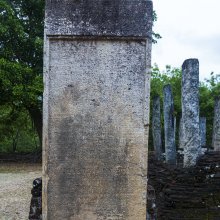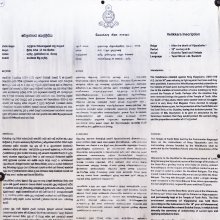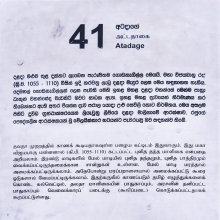Vijayabahu, Vijayabāhu: 2 definitions
Introduction:
Vijayabahu means something in Buddhism, Pali, Hinduism, Sanskrit. If you want to know the exact meaning, history, etymology or English translation of this term then check out the descriptions on this page. Add your comment or reference to a book if you want to contribute to this summary article.
Images (photo gallery)
(+3 more images available)
In Buddhism
Theravada (major branch of Buddhism)
Source: Pali Kanon: Pali Proper Names1. Vijayabahu. King of Ceylon (Vijayabahu I., 1059-1114 A.C.). His earlier name was Kitti; his parents were Moggallana and Lokita (Cv.lvii.42f.; but see Cv.Trs.i.201, n.1), and from his thirtieth year he lived in Mulasala. Later, without the knowledge of his parents, he left home, defeated the general Loka, and became Adipada of Malaya after bringing this province under his power. At the age of sixteen he defeated Kassapa, chief of the Kesadhatus, and became ruler of Rohana as well, assuming the title of Yuvaraja and the name of Vijayabahu. At this time the Colas were in possession of the government at Pulatthipura, and they made efforts to stem the advance of Vijayabahu. They were at first successful, owing to the disunion among the Singhalese themselves, but Vijayabahu conquered the Cola armies near Palutthapabbata and marched to Pulatthipura. He was helped by forces sent by the king of Ramanna, to whom he sent an embassy with various presents. He had, however, to bide his time, and retreated to Vatagiri. From there he went, in due course, to Mahanagahula, his officers having, in the meantime, crushed all opposition in Dakkhinadesa and captured the province of Anuradhapura and the district round Mahatittha. When he felt the right moment had arrived, Vijayabahu marched once more to Pulatthipura and captured it after a siege of one and a half months. From there he advanced to Anuradhapura, spent three months in the city and returned to Pulatthipura. This was fifteen years after he became Yuvaraja. In the eighteenth year he crowned himself king, under the title of Sirisanghabodhi, making his younger brother Virabahu Yuvaraja and governor of Dakkhinadesa, and his other brother, Jayabahu, Adipada and governor of Rohana. The king had several queens, among whom was Lilavati, a Cola princess and daughter of Jagatipala; by her he had a daughter Yasodhara. Another of his queens was a Kalinga princess, Tilokasundari, by whom he had five daughters Subhadda, Sumitta, Lokanatha, Ratanavali and Rupavati and a son called Vikkamabahu. Vijayabahu gave his younger sister, Mitta, in marriage to the king of Pandu, refusing an offer of marriage made by the Cola king.
When peace had been established, Vijayabahu sent messengers to Anuruddha, king of Ramanna, and fetched monks from that country to help in the reformation of the Sangha in Ceylon. He gave over the whole district of Alisara for the use of the monks and built many viharas. He translated the Dhammasangani and held an annual Dandissara offering. He also had the Tipitaka copied, and presented the copies to various monks. Because the Singhalese envoys sent to Kannata were insulted and maimed, the king prepared to send a punitive expedition to Cola, but the Velakkara troops revolted, captured Mitta and her children, and burned the kings palace.
Theravāda is a major branch of Buddhism having the the Pali canon (tipitaka) as their canonical literature, which includes the vinaya-pitaka (monastic rules), the sutta-pitaka (Buddhist sermons) and the abhidhamma-pitaka (philosophy and psychology).
Languages of India and abroad
Sanskrit dictionary
Source: Cologne Digital Sanskrit Dictionaries: Monier-Williams Sanskrit-English DictionaryVijayabāhu (विजयबाहु):—[=vijaya-bāhu] [from vi-jaya > vi-ji] m. Name of a king, [Buddhist literature]
Sanskrit, also spelled संस्कृतम् (saṃskṛtam), is an ancient language of India commonly seen as the grandmother of the Indo-European language family (even English!). Closely allied with Prakrit and Pali, Sanskrit is more exhaustive in both grammar and terms and has the most extensive collection of literature in the world, greatly surpassing its sister-languages Greek and Latin.
See also (Relevant definitions)
Partial matches: Bahu, Vijaya.
Starts with: Vijayabahu Parivena Vihara.
Full-text (+154): Vijayabhuja, Vattalagama, Ravideva, Kittaggabodhipabbata, Erandagalla, Sareheru, Nigamaggamappasada, Velagami Vihara, Paragama Vihara, Dighavatthu, Manihira, Sitalaggamalena, Kasagalla, Villikaba, Mandavataka, Pathina, Vijayasundarama, Kurundiya Vihara, Sirimandagalla, Sanghatagama.
Relevant text
Search found 8 books and stories containing Vijayabahu, Vijayabāhu, Vijaya-bahu, Vijaya-bāhu; (plurals include: Vijayabahus, Vijayabāhus, bahus, bāhus). You can also click to the full overview containing English textual excerpts. Below are direct links for the most relevant articles:
A Short history of Lanka (by Humphry William Codrington)
Chapter V - The Dambadeniya and Gampola Kings (1215 AD—1411 AD)
Chapter VI - The Kotte dynasty and its Portuguese allies (1412 AD—1550 AD)
Middle Chola Temples (by S. R. Balasubrahmanyam)
Vira Rajendra (a.d. 1062-1070) < [Chapter V - Successors of Rajendra I (a.d. 1018 to 1070)]
Part II - The Date Of The Manual < [Introductory Essay]
Early Chola Temples (by S. R. Balasubrahmanyam)
Temples in Punjai < [Chapter VI - Temples of Aditya II’s Time]
Later Chola Temples (by S. R. Balasubrahmanyam)
Vietnamese Buddhist Art (by Nguyen Ngoc Vinh)
2a. The Spread of Buddhism < [Chapter 1 - The evolution of Buddhist Art in South Vietnam and South East Asia]





